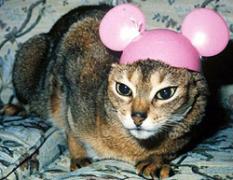Halloween Hazards

Halloween Hazards
For children, Halloween is a long anticipated holiday featuring parties, costumes and above all, candy. Adults celebrate the holiday too, by decorating their homes and yards with ghosts, goblins and jack o’lanterns. But as you can see by the photo above of my cat, Cheetah costumed as Minnie Mouse, pets don’t enjoy Halloween.
Trick or treaters constantly ringing the doorbell can make an anxious pet even more so. When the treats are passed out at the front door, they may try to escape the commotion, slipping outside unnoticed. I recommend confining your cat or dog in its crate or one room of the house while you receive trick or treaters to prevent your pet from being one of the estimated 3-4 million pets entering shelters annually. Only 25% of these pets are reunited with their families. If confining your pet is not possible, double check their collar and ID tags and if they don’t have a microchip get one to help your pet come home if it succeeds in escaping while you dole out the treats.
Halloween food presents another risk for your pets, particularly dogs. Dogs can have quite a sweet tooth and will devour the entire contents of a goodie bag, but cats are too finicky to be tempted by sweets. Just like with children who over indulge on Halloween, too many treats will cause an upset stomach, or worse, vomiting and diarrhea. So keep the cauldron of treats out of reach of your dog.
Feasting on two specific sweets may end in a scary visit to the veterinary emergency room – chocolate, especially dark chocolate and xylitol. Chocolate contains a substance related to caffeine and the darker the chocolate, the more caffeine like substance it contains. Small dogs that eat chocolate are especially at risk for developing vomiting, diarrhea, an elevated heart rate and hyperexcitability. Xylitol is a low calorie sweetener in some diet foods, gum and mints. It is safe for humans, but lethal for dogs who develop low blood sugar, seizures and liver problems. If your pet eats something other than their usual fare on Halloween, don’t hesitate to call Animal Poison Control (888) 426-4435 to find out if you should head to the Animal ER. They take calls 24/7.
When pets are around, jack o’lanterns can be risky. Pumpkin is appealing to some dogs and cats, but that is not the problem. It is the candle inside. Pet hair can easily cat on fire if a nosy or hungry pet decides to investigate the jack o’lantern. Better to use a battery operated flickering light, which will be safer for everyone.
And if you want to see some really cute pets ready for trick or treating, check out WebMD or The AMC Facebook page.
This blog may also be found in the “Tales from the Pet Clinic” blog from WebMD.
_________________________________________________
For nearly a century, The Animal Medical Center has been a national leader in animal health care, known for its expertise, innovation and success in providing routine, specialty and emergency medical care for companion animals. Thanks in part to the enduring generosity of donors, The AMC is also known for its outstanding teaching, research and compassionate community funds. Please help us to continue these efforts. Send your contribution to: The Animal Medical Center, 510 East 62nd Street, New York, NY 10065. For more information, visit www.amcny.org. To make an appointment, please call 212.838.7053.


































